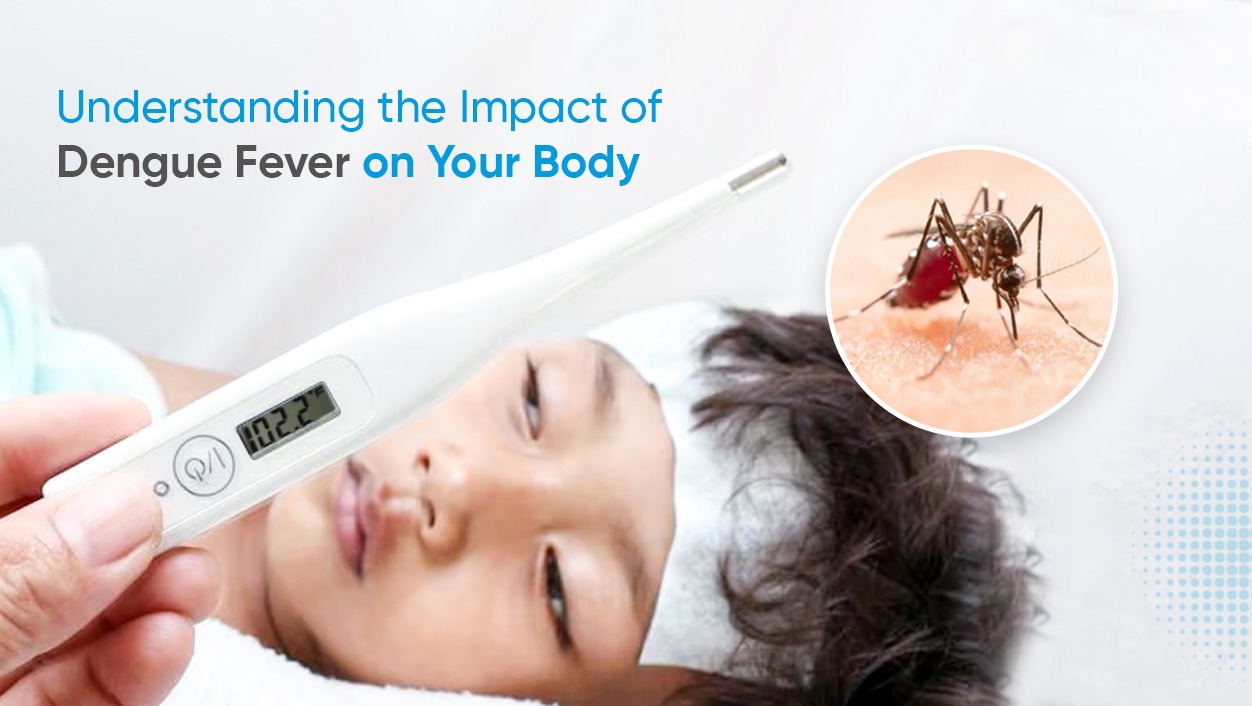What is dengue fever?
Dengue fever is caused by the dengue virus, a mosquito-borne infection primarily transmitted by the Aedes mosquito. This infectious disease is prevalent in tropical and subtropical regions, including parts of Southeast Asia, the Pacific Islands, the Caribbean, and Central and South America. Understanding the impact of dengue fever on the body is crucial for early detection, proper management, and effective prevention.
Transmission and Incubation:
Dengue virus is transmitted to humans through the bites of infected female Aedes mosquitoes, primarily Aedes aegypti. After an infected mosquito bites a person, an incubation period of 4 to 10 days follows before symptoms manifest.
Symptoms:
Dengue fever can manifest on a spectrum of severity, ranging from mild flu-like symptoms to severe, life-threatening complications. High fever, excruciating headache, discomfort behind the eyes, rash, joint and muscular aches, and moderate bleeding, such as gum or nosebleeds, are typical symptoms. The severe form of the disease, known as dengue hemorrhagic fever (DHF) or dengue shock syndrome (DSS), can lead to more serious complications.
Effects on the Immune System:
The dengue virus can impact the immune system in various ways. The initial infection typically leads to the development of immunity against that specific serotype. However, subsequent infections with different serotypes can increase the risk of severe dengue due to a phenomenon known as antibody-dependent enhancement (ADE). ADE can exacerbate the immune response, leading to more severe symptoms.
Impact on Blood Components:
Dengue fever affects the blood, leading to a decrease in platelet count, a condition known as thrombocytopenia. Platelets are crucial for blood clotting, and a low platelet count can result in bleeding tendencies. In severe cases, dengue can progress to dengue hemorrhagic fever, which is characterized by bleeding, plasma leakage, and organ impairment.
Organ Involvement:
Severe dengue can affect multiple organs, including the liver, heart, and kidneys. Hepatic involvement may result in elevated liver enzymes, while cardiac complications can lead to arrhythmias. Acute kidney injury may occur due to the increased permeability of blood vessels and decreased blood flow.
Fluid Leakage and Shock:
Dengue shock syndrome is a severe form of the disease characterized by significant fluid leakage from blood vessels, leading to shock. Plasma leakage can cause a drop in blood pressure, resulting in organ failure and, in extreme cases, death. Early detection and prompt medical intervention are critical to managing shock and preventing complications.
Neurological Manifestations:
While not as common as other symptoms, dengue fever can affect the nervous system. Neurological manifestations may include encephalopathy, characterized by altered mental status, seizures, and neurological deficits. These complications underscore the systemic nature of dengue and its potential impact on various bodily functions.
Recovery and Long-Term Effects:
The majority of individuals with uncomplicated dengue fever recover fully with supportive care. However, the recovery period can vary, and fatigue and weakness may persist for weeks. In some cases, individuals may experience lingering joint pain, a condition known as post-dengue syndrome.
Prevention and Control:
Given the absence of specific antiviral medications for dengue, prevention is crucial. This involves vector control measures to reduce mosquito breeding sites, the use of mosquito repellents, wearing protective clothing, and community engagement in public health initiatives. Additionally, efforts to develop effective dengue vaccines are ongoing.
Global Impact and Challenges:
Dengue fever poses a significant global health challenge. The World Health Organization (WHO) estimates that there are millions of cases annually, with severe dengue contributing to a substantial burden on healthcare systems. Climate change, urbanization, and international travel contribute to the spread of the virus, making dengue a complex and evolving public health concern.
Knowing When to Consult a Doctor for Dengue Fever:
In the case of severe dengue fever, a potentially life-threatening medical emergency, it is imperative to seek immediate medical attention. If you’ve been to an area with known dengue fever and you have a fever with warning signs, consult a healthcare professional promptly.
Warning signs encompass severe stomach pain, vomiting, difficulty breathing, or the presence of blood in your nose, gums, vomit, or stools. For those who have been traveling recently and have developed a fever with mild symptoms indicative of dengue fever, it is advisable to contact their doctor.
This proactive step allows for early assessment and appropriate medical guidance in managing potential dengue-related concerns.
Takeaway:
In conclusion, dengue fever can have a profound impact on the body, ranging from mild symptoms to severe and potentially life-threatening complications. Understanding the dynamics of the disease, its transmission, and the importance of early detection and proper medical care is essential for both individuals and communities. Efforts to control the spread of dengue involve a combination of vector control measures, public awareness, and ongoing research to develop effective preventive and therapeutic interventions
If you have any further questions, please feel free to contact for more information

